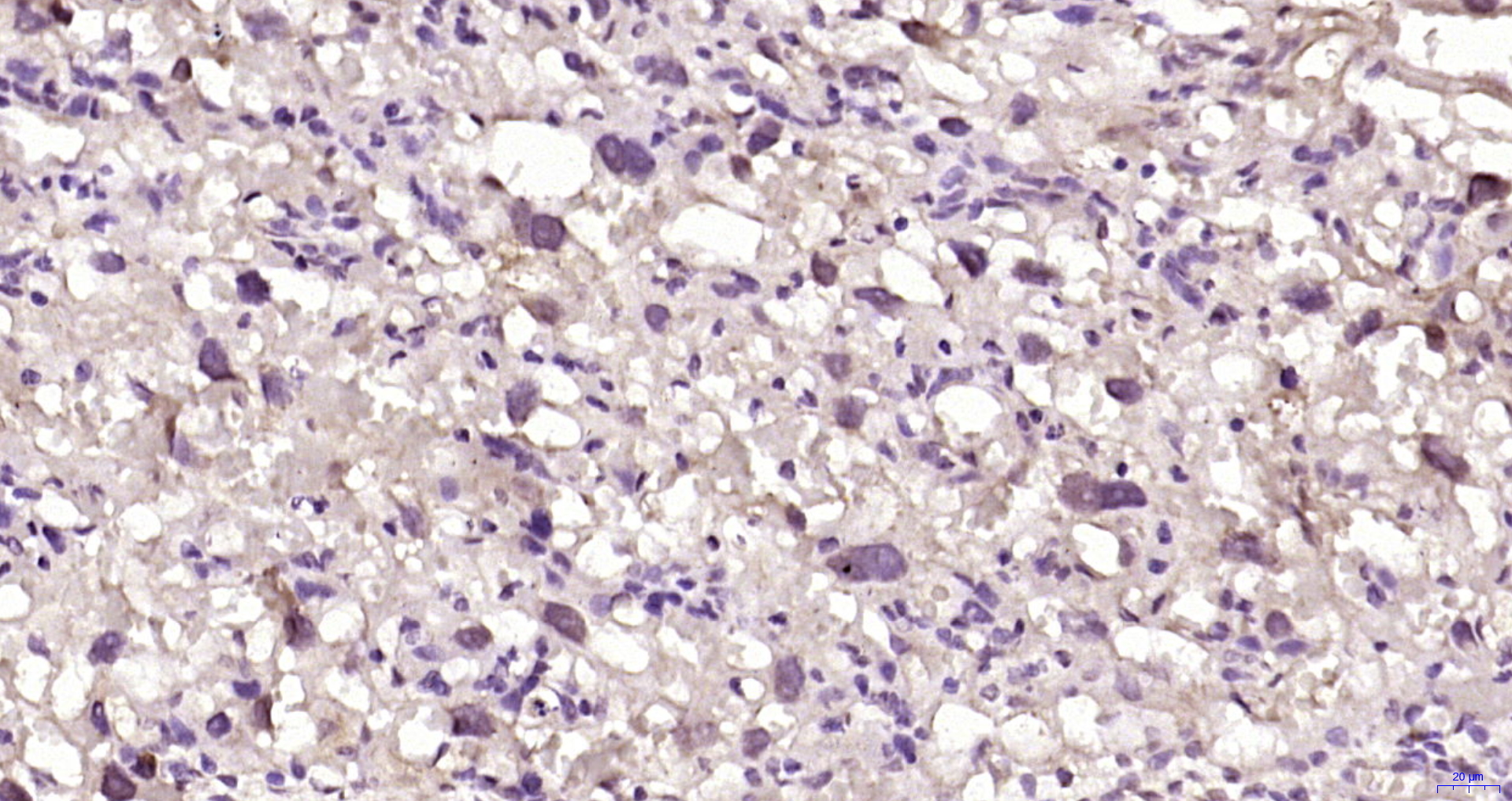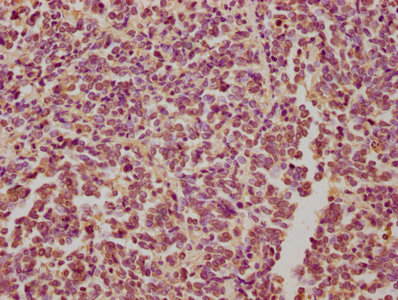![Various whole cell extracts (30 μg) were separated by 10% SDS-PAGE, and the membrane was blotted with DAG1 / beta Dystroglycan antibody [C2C3-2], C-term (GTX124225) diluted at 1:2000. The HRP-conjugated anti-rabbit IgG antibody (GTX213110-01) was used to detect the primary antibody. Various whole cell extracts (30 μg) were separated by 10% SDS-PAGE, and the membrane was blotted with DAG1 / beta Dystroglycan antibody [C2C3-2], C-term (GTX124225) diluted at 1:2000. The HRP-conjugated anti-rabbit IgG antibody (GTX213110-01) was used to detect the primary antibody.](https://www.genetex.com/upload/website/prouct_img/normal/GTX124225/GTX124225_43384_20181109_WB_w_23060522_995.webp)
Various whole cell extracts (30 μg) were separated by 10% SDS-PAGE, and the membrane was blotted with DAG1 / beta Dystroglycan antibody [C2C3-2], C-term (GTX124225) diluted at 1:2000. The HRP-conjugated anti-rabbit IgG antibody (GTX213110-01) was used to detect the primary antibody.
DAG1 / beta Dystroglycan antibody [C2C3-2], C-term
GTX124225
ApplicationsImmunoFluorescence, Western Blot, ImmunoCytoChemistry, ImmunoHistoChemistry, ImmunoHistoChemistry Paraffin
Product group Antibodies
ReactivityHuman, Mouse
TargetDAG1
Overview
- SupplierGeneTex
- Product NameDAG1 / beta Dystroglycan antibody [C2C3-2], C-term
- Delivery Days Customer9
- Application Supplier NoteWB: 1:500-1:3000. ICC/IF: 1:100-1:1000. IHC-P: 1:100-1:1000. *Optimal dilutions/concentrations should be determined by the researcher.Not tested in other applications.
- ApplicationsImmunoFluorescence, Western Blot, ImmunoCytoChemistry, ImmunoHistoChemistry, ImmunoHistoChemistry Paraffin
- CertificationResearch Use Only
- ClonalityPolyclonal
- Concentration0.6 mg/ml
- ConjugateUnconjugated
- Gene ID1605
- Target nameDAG1
- Target descriptiondystroglycan 1
- Target synonyms156DAG, A3a, AGRNR, DAG, LGMDR16, MDDGA9, MDDGC7, MDDGC9, dystroglycan 1, dystroglycan 1 (dystrophin-associated glycoprotein 1)
- HostRabbit
- IsotypeIgG
- Protein IDQ14118
- Protein NameDystroglycan 1
- Scientific DescriptionDystroglycan is a laminin binding component of the dystrophin-glycoprotein complex which provides a linkage between the subsarcolemmal cytoskeleton and the extracellular matrix. Dystroglycan 1 is a candidate gene for the site of the mutation in autosomal recessive muscular dystrophies. The dramatic reduction of dystroglycan 1 in Duchenne muscular dystrophy leads to a loss of linkage between the sarcolemma and extracellular matrix, rendering muscle fibers more susceptible to necrosis. Dystroglycan also functions as dual receptor for agrin and laminin-2 in the Schwann cell membrane. The muscle and nonmuscle isoforms of dystroglycan differ by carbohydrate moieties but not protein sequence. [provided by RefSeq]
- ReactivityHuman, Mouse
- Storage Instruction-20°C or -80°C,2°C to 8°C
- UNSPSC12352203
References
- Franzka P, Henze H, Jung MJ, et al. GMPPA defects cause a neuromuscular disorder with α-dystroglycan hyperglycosylation. J Clin Invest. 2021,131(9):pii: 139076. doi: 10.1172/JCI139076.Read this paper
- Shareef SH, Amin K, Janson C. The Association Between β-Dystroglycan in Airway Smooth Muscle and Eosinophils in Allergic Asthma. Inflammation. 2021,44(3):1060-1068. doi: 10.1007/s10753-020-01401-yRead this paper

![beta dystroglycan antibody [C2C3-2], C-term detects beta dystroglycan protein at cytoskeleton by immunofluorescent analysis. Sample: HeLa cells were fixed in 4% paraformaldehyde at RT for 15 min. Green: beta dystroglycan protein stained by beta dystroglycan antibody [C2C3-2], C-term (GTX124225) diluted at 1:500. Blue: Hoechst 33342 staining. beta dystroglycan antibody [C2C3-2], C-term detects beta dystroglycan protein at cytoskeleton by immunofluorescent analysis. Sample: HeLa cells were fixed in 4% paraformaldehyde at RT for 15 min. Green: beta dystroglycan protein stained by beta dystroglycan antibody [C2C3-2], C-term (GTX124225) diluted at 1:500. Blue: Hoechst 33342 staining.](https://www.genetex.com/upload/website/prouct_img/normal/GTX124225/GTX124225_40961_IFA_w_23060522_893.webp)
![beta dystroglycan antibody [C2C3-2], C-term detects beta dystroglycan protein at cytosol on mouse brain stem by immunohistochemical analysis. Sample: Paraffin-embedded mouse brain stem. beta dystroglycan antibody [C2C3-2], C-term (GTX124225) dilution: 1:250.
Antigen Retrieval: Trilogy? (EDTA based, pH 8.0) buffer, 15min beta dystroglycan antibody [C2C3-2], C-term detects beta dystroglycan protein at cytosol on mouse brain stem by immunohistochemical analysis. Sample: Paraffin-embedded mouse brain stem. beta dystroglycan antibody [C2C3-2], C-term (GTX124225) dilution: 1:250.
Antigen Retrieval: Trilogy? (EDTA based, pH 8.0) buffer, 15min](https://www.genetex.com/upload/website/prouct_img/normal/GTX124225/GTX124225_40961_IHC_M_w_23060522_360.webp)




![IHC-Fr analysis of human skeletal muscle using GTX01940 DAG1 / beta Dystroglycan antibody [43DAG1/8D5]. Staining is localized in the sarcolemma of the fibers.](https://www.genetex.com/upload/website/prouct_img/normal/GTX01940/GTX01940_20200811_IHC-Fr_106_w_23053121_152.webp)



![DAG1 antibody detects DAG1 protein by immunofluorescent analysis. Sample: DIV10 rat E18 primary hippocampal neuron cells were fixed in 4% paraformaldehyde at RT for 15 min. Green: DAG1 stained by DAG1 antibody (GTX105038) diluted at 1:500. Red: Tau, stained by Tau antibody [GT287] (GTX634809) diluted at 1:500. Blue: Fluoroshield with DAPI (GTX30920).](https://www.genetex.com/upload/website/prouct_img/normal/GTX105038/GTX105038_43523_20191125_ICC_IF_R_w_23060120_332.webp)